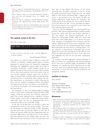 January 2019 in “Paëmi Sino”
January 2019 in “Paëmi Sino” Women with keloid scars often have acne and hair loss, especially those with "true" keloids, indicating a possible hormonal imbalance.
 January 2018 in “Journal of cosmetology & trichology”
January 2018 in “Journal of cosmetology & trichology” The Automatic Biofibre® Hair Implant is a fast and effective hair restoration method that provides immediate cosmetic benefits and good results in over 90% of cases, but requires proper care to avoid complications.

A thorough skin history and examination are essential for diagnosing and treating skin conditions effectively.
 April 2016 in “British Journal of Dermatology”
April 2016 in “British Journal of Dermatology” Eyelashes are important for looks and eye protection, and more people are treating sparse eyelashes; more research is needed to understand eyelash biology and improve treatments.
January 2016 in “Dermatology Online Journal” Hormonal therapy changes skin and hair in transgender patients, who need better researched dermatologic care.
 March 2014 in “Dermatologic Clinics”
March 2014 in “Dermatologic Clinics” More research, better treatments, and public education are needed for dermatological conditions in people of African descent.
 June 2007 in “Endocrinology and Metabolism Clinics of North America”
June 2007 in “Endocrinology and Metabolism Clinics of North America” The foreword introduces a medical issue discussing male hormonal health, treatments, and the effects of conditions like obesity and aging.
 December 2020 in “Journal of Aesthetic Nursing”
December 2020 in “Journal of Aesthetic Nursing” Injecting platelet-rich plasma into the scalp stimulates hair growth, increases hair density, and treats hair loss effectively with minimal side effects.
 316 citations,
June 2017 in “Stem Cell Research & Therapy”
316 citations,
June 2017 in “Stem Cell Research & Therapy” Fat tissue-derived cells show promise for repairing body tissues, but more research and regulation are needed for safe use.
 75 citations,
October 1996 in “Dermatologic Clinics”
75 citations,
October 1996 in “Dermatologic Clinics” Chronic Telogen Effluvium is a hair loss condition in middle-aged women that usually doesn't lead to complete baldness.
 62 citations,
February 2011 in “Expert review of dermatology”
62 citations,
February 2011 in “Expert review of dermatology” Scalp cooling can reduce chemotherapy-induced hair loss and should be available in all hospitals.
 15 citations,
July 2017 in “PubMed”
15 citations,
July 2017 in “PubMed” Injecting a mix of human skin and hair cells into mice can grow new hair.
 8 citations,
March 2015 in “Neuromuscular Disorders”
8 citations,
March 2015 in “Neuromuscular Disorders” People with Myotonic Dystrophy type 1 are more likely to have certain skin conditions, but not more likely to get skin cancer.
 1 citations,
April 2018 in “The journal of investigative dermatology/Journal of investigative dermatology”
1 citations,
April 2018 in “The journal of investigative dermatology/Journal of investigative dermatology” Oral tofacitinib significantly improves lichen planopilaris symptoms without adverse effects.
 May 2023 in “Brazilian Journal of Animal and Environmental Research”
May 2023 in “Brazilian Journal of Animal and Environmental Research” Photobiomodulation effectively treats hair loss in dogs with black hair follicular dysplasia.
 8 citations,
February 2003 in “Annals of Neurology”
8 citations,
February 2003 in “Annals of Neurology” Progesterone treatment improved seizures in a woman with menstrual cycle-related epilepsy, but a wrong medication worsened her condition.
 2 citations,
February 2003 in “Annals of Neurology”
2 citations,
February 2003 in “Annals of Neurology” Neuroimaging suggests that treatments targeting brain steroids could help control epilepsy, especially types linked to the menstrual cycle.
 4 citations,
May 2021 in “Dermatologic Clinics”
4 citations,
May 2021 in “Dermatologic Clinics” The conclusion is that hair loss in women is caused by a mix of hormonal, environmental, and genetic factors, and treatments should target these various causes.
 26 citations,
May 2015 in “Lasers in Surgery and Medicine”
26 citations,
May 2015 in “Lasers in Surgery and Medicine” Laser treatment helped regrow hair in mice by activating a key growth pathway.

Finasteride reduces prostate cancer risk but may increase high-grade tumors; new drugs and better diagnosis are in development, but funding and industry commitment are challenges.
 76 citations,
December 2009 in “Clinics in Dermatology”
76 citations,
December 2009 in “Clinics in Dermatology” Hormonal treatments can help with acne but are not the first choice due to side effects and the need for careful patient selection.
 62 citations,
December 2015 in “Clinical Medicine”
62 citations,
December 2015 in “Clinical Medicine” Improving insulin sensitivity and weight loss can help manage polycystic ovary syndrome (PCOS).
 55 citations,
November 2018 in “American journal of human genetics”
55 citations,
November 2018 in “American journal of human genetics” Mutations in the LSS gene cause a rare type of hereditary hair loss.
 30 citations,
April 1997 in “European journal of endocrinology”
30 citations,
April 1997 in “European journal of endocrinology” The document concludes that managing hirsutism involves identifying the cause, using a scoring system for severity, combining cosmetic and medical treatments, encouraging weight loss, and providing psychological support, while noting the need for more research on drug treatments.
 21 citations,
March 2018 in “Experimental Dermatology”
21 citations,
March 2018 in “Experimental Dermatology” The guide explains how to study human skin fat cells and their tissue, aiming to improve research and medical treatments.
 19 citations,
January 2015 in “Scientific Reports”
19 citations,
January 2015 in “Scientific Reports” GPR39 is linked to certain cells in the sebaceous gland and helps with skin healing.

Onabotulinumtoxin-A effectively treated a painful scalp condition when other treatments failed.
 September 2023 in “Frontiers in bioengineering and biotechnology”
September 2023 in “Frontiers in bioengineering and biotechnology” JAGGED1 could help regenerate tissues for bone loss and heart damage if delivered correctly.
 January 2023 in “Brazilian Journals Editora eBooks”
January 2023 in “Brazilian Journals Editora eBooks” Nursing staff's mental health was affected during the COVID-19 pandemic.
 August 2022 in “Deleted Journal”
August 2022 in “Deleted Journal” Nutritional education reduces chemotherapy side effects and improves health in breast cancer patients.





























